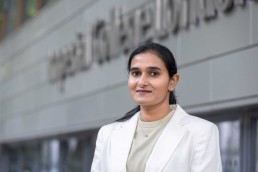Research and impact | By John Stevenson
STEM students and alumna point the way to a sustainable future
2022 has been a banner year for City’s STEM students Nour Ben Gaied and Ali Ahmed, and for alumna Dr Nausheen Basha whose ingenuity is offering innovative solutions in sustainability.
Nour and Ali: Solar powered cold storage

Nour Ben Gaied (MSc Data Science) and Ali Ahmed (MSc Temporary Works and Construction Method Engineering) emerged on top, winning the Gold prize with teammates from the Independent University of Bangladesh (IUB) in the Grand Final of the Efficiency for Access Design Challenge staged earlier this year by Engineers Without Borders UK (EWB UK) and the Efficiency for Access Design Coalition and funded by UK Aid and The IKEA Foundation.
The winning team, including Sadik Abdal and Tashfiah Tahsin from IUB, collaborated on the project titled, Solar Direct Drive Cold Storage System for Off-Grid Preservation of Fish and Perishable Goods.
Among the project’s goals were reducing food insecurity in Bangladesh by improving the food supply chain through a more sustainable preservation of fish and perishables. The winning team designed a transportable and affordable multi-use solar powered container that has three separate chambers; a refrigeration changer (2°C-8°C) and two heavily insulated freezer chambers (up to 20°C); and cutt energy costs and overhead costs related to replacing heavy machinery and batteries.
Now in its third year, the Efficiency for Access Design Challenge invites teams of university students from around the world to collaborate and design sustainable and high-performing appliances intended for communities with little or unreliable access to electrical grids. By bringing together and inspiring students, the competition provide a basis for students to develop initiative and innovation in the solar appliance sector and to address barriers that limit market expansion in this area.
Year 3 of the Challenge began in September 2021 with over 150 students from 22 universities across Bangladesh, Benin, Cameroon, India, Kenya, Mozambique, Nigeria, Pakistan, Senegal, Sweden, Uganda, the UK, the USA and Zimbabwe taking part. Students submitted their projects in April 2022 and presented their projects online to a panel of expert judges in late May.
Nausheen Basha: ‘Among the best, brightest and bravest in engineering’

Nausheen Basha (PhD Mechanical Engineering, 2021) was listed among the Women’s Engineering Society (WES) Top 50 Women in Engineering, which was announced on 23 June 2022 on the International Women in Engineering Day (#INWED).
The WES in association with The Guardian and Ball Corporation, a global supplier of sustainable packaging, invited nominations on numerous factors including candidates’ ability to support and combat climate change, work as an advocate for women in STEM, their drive to make a difference within the engineering industry and achieve beyond what would normally be expected.
Nausheen was cited by the WES as among the “best, brightest and bravest in engineering, the inventors and innovators who dare to be part of the solution and are helping to build a brighter future”.
Nausheen is a Chartered Engineer (CEng) and Project Manager at Imperial College London where she manages the UKRI-funded project, PREMIERE, which uses AI to create the next generation of ultra-fast predictive models in multiphase flow systems dealing with the flow of gas, liquid, and potentially solids flowing simultaneously in pipes, channels and reactors.
“I am a chartered engineer and my current research focusses on optimising reactors to improve their performance. These reactors are used in polymerisation, the manufacturing of nanoparticles, water treatment, the manufacturing of pharmacuticals and in heat treatment. These well-designed reactors will ultimately result in energy efficiency and sustainable manufacturing. The reactors are optimised for mixing through machine learning based models of Bayesian optimisation with computational fluid dynamics (CFD). This results in a faster digital design space for evaluating 100s of computer-generated reactor shapes for performance exploration and exploitation.”
PREMIERE seeks to better understand the behaviour of these flow patterns and deploys intelligent computer simulations to predict how these patterns can be influenced for the better – whether the flow is in the body or a chemical plant. The aim is to enhance productivity and efficiency across manufacturing, energy and healthcare.
In 2021, her PhD research was recognised by the Institute of Refrigeration (IOR) and she received the prestigious Ted Perry Award. Her previous work to develop air compressors at City was deployed in supplying oxygen cylinders during the crucial Covid-19 pandemic intervention in India.